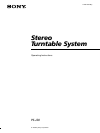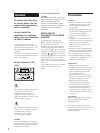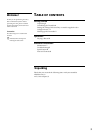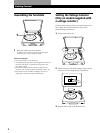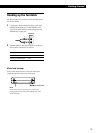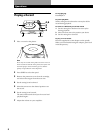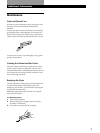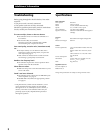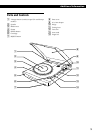
8
Additional Information
Specifications
Motor and Platter
Drive system Belt-drive
Motor DC servo motor
Platter 18.5cm, molded aluminum alloy
Speeds 33
1
/
3
and 45 r/min, 2 speed
Wow and flutter Less than 0.25% (WRMS)
Signal to noise ratio More than 45 dB (DIN-B) with supplied
cartridge
Tone Arm
Type Static balanced integrate straight arm
Effective arm length 204 mm
General
Power requirements U.S.A. and Canadian models: 120V AC,
60 Hz
Europe model: 220 – 230 V AC, 50/60
Hz
Other countries: 110 – 120/220 – 240 V
AC, 50/60 Hz
Power consumption 5 W
Dimensions Approx. 280 x 87 x 314 mm (w/h/d)
(11 x 3
7
/
16
x 12
3
/
8
inches)
Mass 2kg (4 lb 6 oz)
Supplied Accessories
45 r/min adaptor (1)
Rubber mat (1)
Design and specifications are subject to change without notice.
Troubleshooting
Before going through the check list below, first make
sure that:
• The power cord is securely connected.
• The speaker cords are securely connected.
Should any problem persist after you have made these
checks, consult your nearest Sony dealer.
The tone arm skips, skates or does not advance.
b The turntable is not level. Place the turntable on a
level surface.
b The record is dirty or scratched.
Clean the record with a commercially available
record cleaning kit, or replace the record.
Poor sound quality, excessive noise, intermittent sound,
etc…
b The stylus is dirty or worn. Remove dust on the
stylus using a stylus cleaning brush, or replace the
worn stylus (see page 7).
b Dust or dirt has collected on the record. Clean the
record using a good quality record cleaner.
Rumble or low-frequency howl*.
b The turntable is placed too close to speakers. Move
speakers away from the turntable.
Platter does not rotate.
b Make sure the power cord is inserted all the way into
an AC wall outlet.
Sound is too low or distorted.
b The turntable is not connected to the PHONO inputs
on the amplifier (see page 5).
b Set MM.AMP. ON/OFF to the appropriate position
(see page 5).
* This phenomenon, called “acoustic feedback”, occurs
when vibrations from the speakers are transmitted
through the air or via solid objects (such as shelves, a
cabinet, or the floor) to the turntable where they are
picked up by the stylus, amplified and reproduced
through the speakers.



